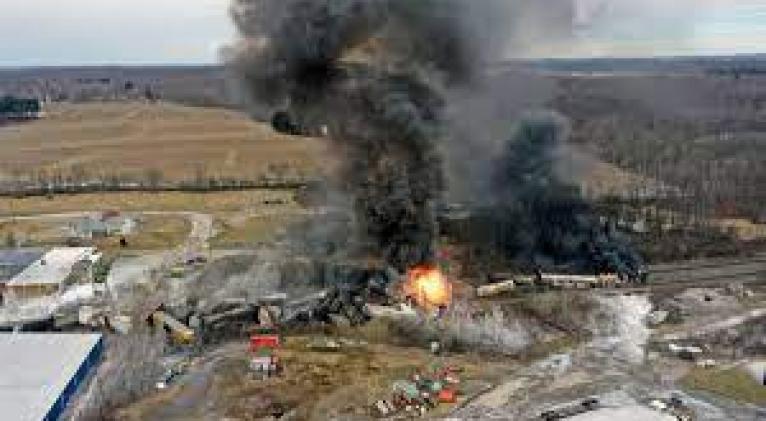US Company to Sample for Dioxins at Ohio Train Derailment Site
especiales

The "controlled release" of chemicals after the train derailment raised further concern about environmental contamination in the East Palestine area.
On Thursday, the U.S. Environmental Protection Agency (EPA) said that it will require railroad company Norfolk Southern to test directly for dioxins in East Palestine, Ohio.
The announcement came nearly a month after a Norfolk Southern train carrying hazardous chemicals derailed in East Palestine. Responders later conducted a "controlled release" of some of those chemicals to avert a larger explosion at the site, raising concerns of pollution in the region.
"If dioxins are found at a level that poses any unacceptable risk to human health and the environment, EPA will direct the immediate cleanup of the area as needed," the agency said, adding that it will require Norfolk Southern to conduct a background study to compare any dioxin levels around East Palestine to dioxin levels in other areas not impacted by the train derailment.
"Over the last few weeks, I've sat with East Palestine residents and community leaders in their homes, businesses, churches, and schools. I've heard their fears and concerns directly," EPA Administrator Michael Regan said, adding that the EPA it has collected at least 115 samples in the potentially impacted area, which include samples of air, soils, surface water, and sediments."To date, EPA's monitoring for indicator chemicals has suggested a low probability for release of dioxin from this incident. EPA's air has detected only low levels of 1,4-dichlorobenzene typical of ambient background concentrations, the U.S. agency said.
Dioxins may be found in any urban or rural environment as a result of common processes such as burning wood or coal. Dioxins break down slowly in the environment so the source of dioxins found in any area may be uncertain, it noted.
The incident, which occurred on the night of Feb. 3, involved 11 tank cars carrying hazardous materials that subsequently ignited, fueling fires that damaged an additional 12 non-derailed railcars.
First responders implemented a one-mile evacuation zone surrounding the derailment site that affected up to 2,000 residents. There were no reported fatalities or injuries, according to a report issued by the National Transportation Security Board (NTSB) last week.
Responders mitigated the fire on Feb. 5, the NTSB report stated. But five derailed "specification tank cars carrying 115,580 gallons of vinyl chloride" continued to concern authorities because the temperature inside one tank car was still rising.The NTSB said responders later scheduled a "controlled venting" of the five vinyl chloride tank cars to release and burn the vinyl chloride and dug ditches to contain released vinyl chloride liquid while it vaporized and burned. The controlled venting began on Feb. 6, which discharged toxic and potentially deadly fumes into the air.
While residents were allowed to return to their homes in East Palestine two days later, they remain concerned about the handling of the incident as well as the health impact of exposure to those chemicals.
On Thursday, U.S. President Joe Biden said that he will visit East Palestine "at some point." He has been under pressure from Republicans who have lashed out at his administration's response to the incident and pointed to his absence from East Palestine as a failure.
Biden issued a statement talking about new legislation that "provides us with tools to hold companies accountable to prevent terrible tragedies like the Norfolk Southern derailment in East Palestine and to make those communities whole."














Add new comment